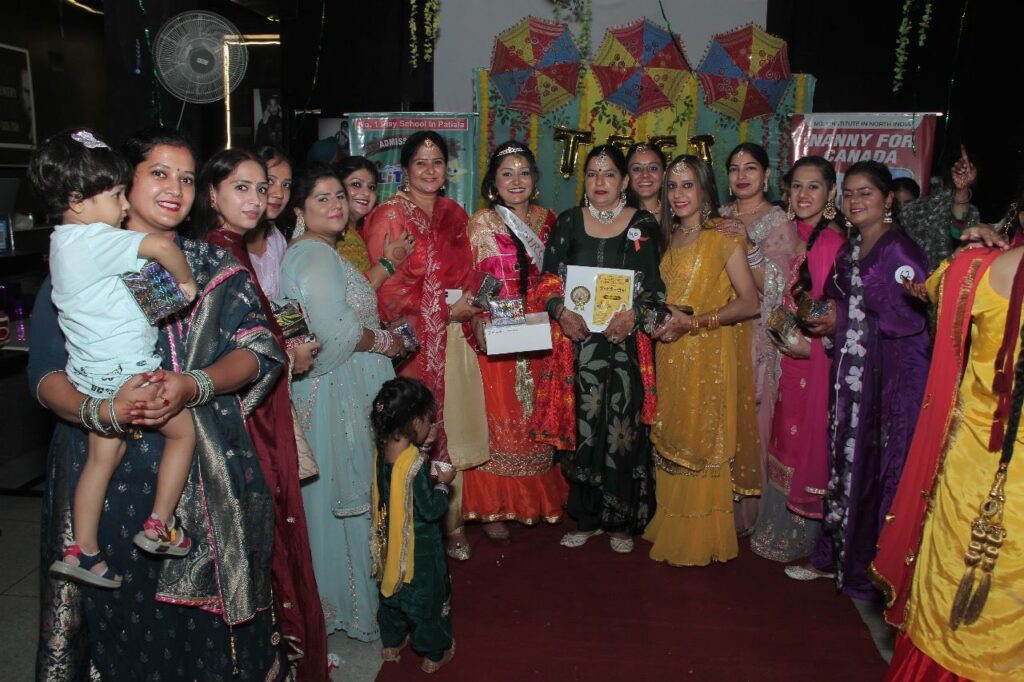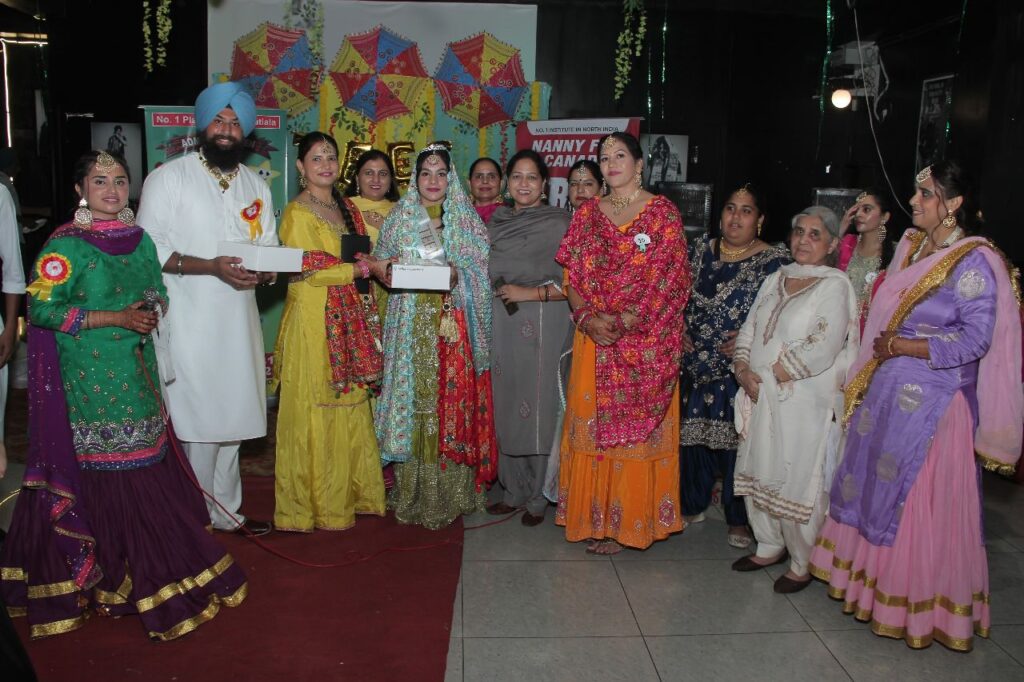Jaskaran Singh Folk Dance Academy Celebrates Teej Festival at Street 22, Patiala
The vibrant city of Patiala once again came alive with the rhythmic beats and colorful festivities of the Teej festival, as the esteemed Jaskaran Singh Folk Dance Academy organized an unforgettable celebration at Street 22. The event, held on the auspicious occasion of Teej, witnessed an amalgamation of traditional customs, spirited performances, and community bonding, all under the expert guidance and impeccable organization of the academy.
Introduction to Teej Festival
Origin and Significance of Teej
Teej, a festival celebrated predominantly in India, particularly in the northern states like Punjab, Haryana, Rajasthan, and Uttar Pradesh, marks the advent of the monsoon season. Rooted deeply in Hindu mythology, Teej is dedicated to Goddess Parvati and commemorates her union with Lord Shiva. The festival symbolizes marital bliss, fertility, and the joy of women, making it a significant cultural and religious event.
In Punjab, Teej holds a special place as it not only marks the onset of the rainy season but also celebrates the resilience and spirit of women. It is a time when women adorn themselves in traditional attire, engage in folk dances, and participate in various rituals that highlight sisterhood and marital harmony. The festival fosters community spirit and provides an opportunity for women to showcase their talents and creativity.
Traditional Customs and Practices
The celebration of Teej is characterized by numerous traditional customs and practices that have been preserved through generations. Women dress in vibrant sarees or lehengas, often in bright colors like green, red, and yellow, symbolizing the lushness of the monsoon season. The use of mehndi (henna) on hands and feet is a significant aspect, with intricate designs signifying joy and prosperity.
Fasting is another important ritual observed by many women during Teej, aimed at seeking blessings for marital harmony and the well-being of their families. The festival is also marked by the singing of folk songs and the performance of traditional dances such as Giddha, which is a celebratory dance form performed by women. These dances are not only a form of entertainment but also a means of storytelling, often narrating tales of love, devotion, and bravery.
Jaskaran Singh Folk Dance Academy
Background of the Academy
The Jaskaran Singh Folk Dance Academy, founded by the renowned folk dancer Jaskaran Singh, has been a cornerstone in preserving and promoting Punjabi folk dance and culture in Patiala. Established over a decade ago, the academy has nurtured countless aspiring dancers, providing them with the platform to hone their skills and showcase their talent on various stages.
The academy’s mission goes beyond teaching dance; it aims to keep the rich cultural heritage of Punjab alive by organizing events, workshops, and festivals that celebrate traditional art forms. With a dedicated team of instructors and a supportive community, the Jaskaran Singh Folk Dance Academy has become synonymous with excellence in folk dance education and cultural preservation.
Preparation for the Event
Organizing a grand Teej festival celebration is no small feat, and the Jaskaran Singh Folk Dance Academy spared no effort in ensuring the event’s success. Months of meticulous planning went into selecting the perfect venue, Street 22, a bustling area in Patiala known for its accessibility and vibrant ambiance. The academy’s team coordinated with local authorities to secure the location, ensuring ample space for performances, competitions, and audience seating.
The preparation process also involved extensive rehearsals, not just for the dance performances but also for the various competitions that would take place during the event. Participants were selected through auditions, and the academy provided training and guidance to help them prepare for their respective categories. From stage setup and sound arrangements to decoration and lighting, every detail was carefully managed to create an immersive and festive atmosphere.
Interviews with the organizers revealed the challenges faced during the preparation phase, including coordinating with multiple stakeholders, managing logistics, and ensuring the safety and comfort of all attendees. However, the unwavering dedication and passion of the academy’s team overcame these obstacles, resulting in an event that was both seamless and spectacular.
The Event at Street 22, Patiala
Event Overview
The Teej festival celebration at Street 22 was a grand affair, attracting a diverse crowd of locals and visitors alike. The venue was transformed into a vibrant hub of activity, adorned with traditional decorations, colorful drapes, and intricate rangoli designs that added to the festive spirit. The air was filled with the melodious sounds of folk music, and the aroma of delicious Punjabi delicacies wafted through the crowd, enticing attendees to indulge in the culinary delights on offer.
The event commenced with a grand opening ceremony, featuring a traditional aarti and prayers to Goddess Parvati, invoking blessings for the festival and the community. This was followed by a series of performances, including folk dances, music, and theatrical acts that highlighted the rich cultural tapestry of Punjab. The audience was treated to mesmerizing performances by the academy’s talented dancers, showcasing various folk dance forms like Bhangra, Giddha, and Jhumar.
Cultural Programs and Competitions
One of the main highlights of the event was the array of competitions organized to celebrate the talents of the participants. These competitions were meticulously categorized to cover different aspects of the festival and traditional culture. The categories included Miss Teej, Mrs. Teej, Sunaakhi Punjaban (Best Traditional Attire), Best Walk, Best Dress, and Best Mehndi.
Each competition category was designed to highlight specific talents and aspects of the festival:
- Miss Teej and Mrs. Teej: These titles were awarded to participants who embodied the spirit of Teej through their grace, beauty, and cultural representation. Miss Teej focused on younger participants, while Mrs. Teej was dedicated to married women, celebrating their role in family and community.
- Sunaakhi Punjaban (Best Traditional Attire): This category emphasized the importance of traditional clothing in Punjabi culture. Participants showcased their best traditional outfits, often featuring vibrant colors, intricate embroidery, and accessorized with traditional jewelry.
- Best Walk: This competition assessed the participants’ poise, confidence, and ability to carry themselves with elegance and grace, reflecting the dignity and spirit of the festival.
- Best Dress: Similar to the traditional attire category, this competition focused on the overall presentation and creativity of the participants’ outfits, encouraging them to incorporate contemporary elements while maintaining cultural authenticity.
- Best Mehndi: This category celebrated the artistry of henna designs. Participants displayed their mehndi skills, with intricate and beautiful patterns adorning their hands and feet.
The judging process was rigorous, with each category evaluated based on specific criteria such as originality, adherence to traditional elements, creativity, and overall presentation. The presence of esteemed judges added credibility and prestige to the competitions, making the titles highly coveted.

Profiles of the Judges and Special Guests
Dr. Harinder Hundal
Dr. Harinder Hundal, a Professor at Punjabi University, Patiala, is a respected academician known for his contributions to Punjabi literature and culture. With numerous publications and research in Punjabi folklore and dance, Dr. Hundal brings a wealth of knowledge and expertise to the judging panel. His insightful feedback and deep understanding of cultural nuances make him an invaluable judge for the Teej festival competition.
Dr. Aman Patiala
Dr. Aman Patiala serves as an Ayurvedic Medical Officer and Life Coach, combining traditional Ayurvedic practices with modern life coaching techniques. His holistic approach to health and wellness aligns perfectly with the spiritual and cultural essence of Teej. Dr. Patiala’s presence as a judge underscores the event’s commitment to promoting overall well-being and cultural harmony.
Mrs. Jinder Jeet Dhillon
Mrs. Jinder Jeet Dhillon, Manager at M.K.M.V. Patiala, brings her organizational acumen and managerial expertise to the judging panel. With years of experience in managing educational institutions, Mrs. Dhillon provides a balanced perspective on the participants’ performances, focusing on both cultural representation and personal expression.
Mrs. Richa Sharma
Mrs. Richa Sharma, Headmistress at M.K.M.V. Patiala, is renowned for her dedication to education and community service. Her role as a judge emphasizes the importance of nurturing young talent and fostering a sense of cultural pride among the youth. Mrs. Sharma’s insights into the participants’ performances highlight the educational and developmental aspects of the festival.
Participant Experiences and Winner Interviews
Interviews with Participants
Participants of the Teej festival shared their experiences and the joy they derived from being part of the celebration. Many expressed how the event provided them with an opportunity to reconnect with their cultural roots and showcase their talents. The rigorous preparation and rehearsals not only enhanced their dance and performance skills but also fostered a sense of camaraderie and community spirit.
One participant, Ravinder Kaur, who won the title of Miss Teej, shared, “Participating in this event was a dream come true. The support from the academy and the guidance from our instructors were instrumental in helping me prepare. Winning Miss Teej is an honor, and it motivates me to continue celebrating and preserving our rich cultural heritage.”

Winner Interviews
- Ravinder Kaur – Miss Teej: Ravinder expressed her gratitude for the opportunity to participate and thanked the judges and organizers for their support. She emphasized the importance of cultural festivals in keeping traditions alive and fostering unity within the community.
- Harpreet Kaur – Mrs. Teej: As the winner of Mrs. Teej, Harpreet highlighted the significance of the festival in strengthening family bonds and celebrating the roles of married women. She shared her joy in representing her family and community through her performance.
- Ravneet Kaur – Best Dress: Ravneet discussed her inspiration behind her traditional attire, focusing on the intricate embroidery and vibrant colors that reflect Punjabi culture. She appreciated the platform to showcase her creativity and cultural pride.
- Manreet Kaur – Best Walk: Manreet talked about the confidence and poise required for the Best Walk competition. She expressed her delight in winning and the encouragement she received from fellow participants.
- Harman – Sunaakhi Punjaban: Harman, awarded for her traditional attire, shared her love for Punjabi fashion and how she enjoys incorporating traditional elements into her wardrobe. She thanked the sponsors for their generous support.
- Simmi – Best Mehndi: Simmi, the Best Mehndi winner, spoke about her passion for henna art and the joy of decorating her hands with intricate designs. She viewed the competition as a way to showcase her artistic skills and cultural affinity.
Sponsorship and Community Support
Role of Sponsors
The success of the Teej festival was significantly bolstered by the generous support of sponsors who contributed to enhancing the overall experience for attendees and participants alike.
- Manny Nanny: Owned by Harvinder Kaur, Manny Nanny provided return gifts to all the guests, adding a personal touch and a token of appreciation for their participation. These gifts were well-received, enhancing the festive atmosphere and leaving a lasting impression on attendees.
- Moledro Arkane: This sponsor contributed handcrafted purses for the winners, adding a unique and personalized element to the awards. The intricately designed purses symbolized the craftsmanship and creativity that the festival aimed to celebrate.
- Ishmeet Kaur from Ambala: Ishmeet Kaur sponsored traditional Phulkaris (embroidered shawls), which were presented to the winners as part of their awards. These beautiful garments not only served as prizes but also highlighted the importance of traditional attire in Punjabi culture.
Community Involvement
The Teej festival celebration was a testament to the strong community bonds in Patiala. The event drew participation from various segments of the society, including families, local businesses, and cultural enthusiasts. Attendees expressed their appreciation for the event, noting how it provided a platform for cultural expression and community engagement.
Local businesses also benefited from the increased footfall, with many setting up stalls to sell traditional crafts, clothing, and delicacies. This not only supported the local economy but also promoted Punjabi artisans and entrepreneurs.
Interviews with attendees revealed a deep sense of pride and joy in witnessing the vibrant celebrations. Many highlighted how such events reinforce their cultural identity and provide opportunities for the younger generation to learn about and appreciate their heritage.
Conclusion and Future Prospects
Reflection on the Event
The Teej festival celebration at Street 22, Patiala, organized by the Jaskaran Singh Folk Dance Academy, was a resounding success. The event showcased the rich cultural heritage of Punjab, provided a platform for talented individuals to shine, and fostered a sense of community and togetherness. The meticulous planning, coupled with the passion and dedication of the organizers and participants, resulted in an event that was both joyous and memorable.
Looking Ahead
The success of this year’s Teej festival has set a high benchmark for future celebrations. The Jaskaran Singh Folk Dance Academy plans to continue organizing such events annually, with aspirations to expand the reach and impact of their cultural initiatives. Future events may include more diverse performances, larger participant pools, and enhanced community engagement activities, ensuring that Punjabi culture remains vibrant and dynamic.
Additionally, the academy is exploring opportunities to collaborate with other cultural organizations and sponsors to bring even more enriching experiences to the community. By leveraging digital platforms, there is potential to showcase the festival to a broader audience, including those unable to attend in person, thereby promoting Punjabi culture on a larger scale.
Final Thoughts
Cultural events like the Teej festival play a crucial role in preserving and promoting traditional art forms, fostering community spirit, and providing a sense of identity and pride among participants and attendees. The Jaskaran Singh Folk Dance Academy’s commitment to these values ensures that the rich cultural tapestry of Punjab continues to thrive, inspiring future generations to cherish and uphold their heritage.
As the festival concluded with heartfelt gratitude from the organizers and joyous celebrations from the participants, it was clear that the spirit of Teej had once again brought the community together in a harmonious and festive embrace. The enduring legacy of such events lies in their ability to unite people, celebrate diversity, and keep the flames of tradition burning brightly in the modern world.
